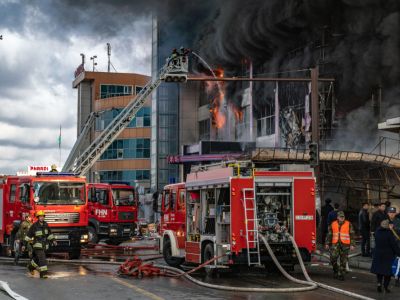The two leading hardline Palestinian groups, Hamas and Islamic Jihad, on Wednesday rejected a ceasefire call by Palestinian President Yasser Arafat, vowing to continue their resistance to Israel's occupation of Palestinian land.
"Our position is based on the rights of Palestinians to liberate their country," said senior Hamas official Abdelaziz al-Rantissi.
"As long as the occupation continues, the resistance will continue," AFP quoted him as saying.
Abdallah Shami, one of the Islamic Jihad's most prominent figures in the Gaza Strip, said the Islamic Jihad would “stop attacking Israeli civilians if the occupation troops ceased attacking Palestinian civilians,” Haaretz newspaper quoted him as saying.
However, he added that attacks on soldiers and Jewish settlements would continue.
In a statement issued Tuesday, the group said, "Islamic Jihad in Palestine rejects the so-called cease-fire, which comes at a time when the Zionist enemy continues its aggression against our defenseless Palestinian people."
Israelis and the Palestinians launched a tentative ceasefire in a bid to end a year-long bloodbath in the Occupied Territories.
US President George W. Bush said that the breakthrough offered "a glimmer of hope" and vowed to "stay involved in the region" to help build on its potential.
With a fragile calm having descended on the Palestinian territories for the first time in months, Israeli Foreign Minister Shimon Peres said: "Undoubtedly, I think the time has come to meet," according to Haaretz newspaper.
Israel began withdrawing its troops from positions around the West Bank towns of Jericho and Jenin on Tuesday evening, following an earlier order by Prime Minister Ariel Sharon for all Israeli army-initiated action in the West Bank and the Gaza Strip to end, said the paper.
Sharon's instruction for the pullout from the two towns - under Palestinian civil and security control in Area A - came in response to orders issued Monday by Arafat, who told his security forces to observe a full ceasefire, even in the face of "Israeli aggression."
"This morning I reiterated my orders to all my security commanders to act intensively in securing a ceasefire on all fronts, and in every town and village," Arafat told reporters in Gaza City.
"If Arafat really wants to calm the area, we want to help, to give Arafat a chance," said defense ministry spokesman Yarden Vatikay, adding that Israel remained skeptical about Arafat's intentions.
Israeli Defense Minister Benjamin Ben Eliezer said that the command given to the army was intended to “test if the Palestinians are indeed willing to comply with a 48-hour ceasefire,” as demanded by Sharon earlier this week.
"I think it's the most significant thing that has happened in the last few months," said chief Palestinian negotiator Saeb Ereikat, who stressed that the Israelis must move "immediately" to open talks and lift their stranglehold on the Palestinian territories, according to AFP.
Sharon said Sunday he would only allow Peres to meet Arafat if the latter ordered a ceasefire and strictly enforced 48 hours of calm.
Ereikat also called for a senior US diplomat to be present at the talks and for international observers to be deployed to monitor the ceasefire, something Israel has staunchly opposed.
The breakthrough came after the United States exerted massive pressure on both sides to find a way of tackling violence surrounding the Palestinian Intifada, or uprising, which has left more than 800 people dead, the overwhelming majority of them Palestinians, according to AFP’s estimates.
Washington has been pressing hard for such an accord to relieve spiraling Middle East tensions as it seeks the support of Arab leaders in forming a global anti-terror coalition following last week's devastating terrorist attacks in New York and Washington.
Bush suggested the fragile breakthrough might be tied to the kamikaze strikes which destroyed the World Trade Center and damaged the Pentagon, leaving nearly 6,000 people dead or missing.
"I hope in my heart of hearts that out of this evil comes good. I think it will," he said during a joint Oval Office appearance with French President Jacques Chirac.
"One of the goods that can come is that people involved with the Middle East conflict that both leaders here want to resolve realize that a terrorist way of life is not going to lead to a peaceful resolution for people," he said, cited by AFP.
Bush said earlier: "We've had very positive developments in the Middle East today. The next step, of course, is to stay involved in the region, is to work with both the Palestinians and the Israelis to encourage them to seize the moment."
The Bush administration had kept its distance from the conflict before the massive terrorist attacks on New York and Washington last week.
But the aftershock of the anti-American attacks and Bush's building of a global coalition against terrorism appeared to have swept aside such differences and galvanized the stalled peace process, according to the agency.
Russia welcomed the breakthrough, hailing Arafat for "a serious positive step" in the peace process, the foreign ministry said.
"We hope that both the Israeli and the Palestinian sides would use this to break the chain reaction of violence and work urgently at restoring the peace process," the Russian Foreign Ministry said in a statement, cited by the agency.
Russia is a co-sponsor, along with the United States, of the Middle East peace process, and has traditionally favored the Arab side, while the US has poured its military aid and diplomatic support into Israel.
In London, British Foreign Secretary Jack Straw also welcomed the tentative ceasefire, saying he hoped Israel and the Palestinians would now try to rebuild the peace process.
Arafat offered his full support to Bush's worldwide crackdown on terrorism, winning US Secretary of State Colin Powell's thanks and praise.
"We have some promise this morning and let's hope that we can see some developments that will continue this sense of promise that is with us this morning," Powell said at a news conference in Washington.
The German television news channel NTV, meanwhile, said credit for the truce went to German Foreign Minister Joshka Fischer, according to Haaretz.
Immediately after the attacks in the United States, Fischer spoke with Powell and the latter "gave Fischer the green light to work for calm in the Middle East," NTV said, without providing more details – Albawaba.com
© 2001 Al Bawaba (www.albawaba.com)









